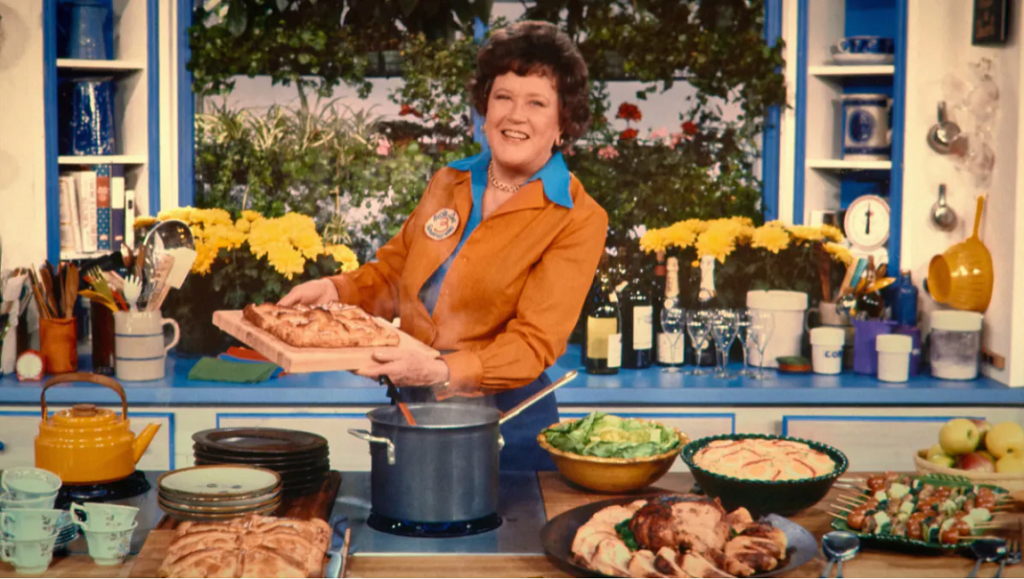Julia doesn’t cover a lot of new territory for the already initiated, but it’s still a delightful bio-doc made with plenty of love.
In a society where celebrity chefs are household names and hyper-specific neighborhood food tours abound, it’s easy to forget that viral foodie culture is a relatively recent phenomenon. But in the unglamorous world of 1960s Boston public-access television, its first breakthrough star emerged: Julia Child, standing 6’3″ and making her small screen debut at age 51. But Child was already a star by the time of her show, The French Chef. Thanks to her role as co-author of the seminal cookbook Mastering the Art of French Cooking, she almost single-handedly released American kitchens from the iron grip of Jell-O salad and introduced fresh ingredients and classic techniques to humble housewives across the country.
Julie Cohen and Betsy West, who helmed 2018’s Oscar-nominated RBG, reunite for Julia, a documentary that’s as buttery and crowd-pleasing as its subject’s signature dishes. For die-hard Child fans, of which there are many, Julia isn’t likely to cover any new ground. It’s neither a fictionalized flight of fancy in the vein of Nora Ephron’s Julie & Julia nor a scandalous exposé of secrets and lies. In fact, much of Child’s’ objectively interesting World War II military career, where she worked at the Office of Strategic Services (a precursor to the CIA) and helped develop shark repellant, is glossed over by a talking head, who archly declares that “She was not a spy!”
From Child’s charmed upbringing in idyllic Pasadena, California to her carefree Smith College days and her eventual encounter with a life-changing sole meunière in Paris, Cohen and West amble down a well-worn but still satisfying biographical path. This by-the-numbers timeline is enlivened with borderline pornographic shots of various dishes, including her famous boeuf bourguignon and a downright racy poached pear tart. Consider yourself warned: do not view on an empty stomach. And of course, there’s ample archival footage of Child behind the camera, gamely teaching women across America how to roast a chicken or debone a fish. As the decades progressed, she remained a comforting mainstay: same short hair, same flutey voice, same approachable but unflappable style. For her, each successful recipe was a triumph, but every (inevitable) flub was a learning opportunity. It’s no wonder viewers, previously sustained on a diet of instant mashed potatoes and canned soup, flocked to her show season after season. Even Dan Aykroyd blessed America with a Saturday Night Live spoof featuring a falsetto and gallons of fake blood.
Alongside this agreeably nostalgic footage, Julia’s most winning feature is its many interviews with Child’s friends, family, and mentors, who take turns offering insight into her personality and ongoing influence. Equally endearing are her many voiceovers, taken from archival interviews, and the peeks into decades of correspondence with her beloved husband Paul. A quiet intellectual who worked for the U.S. State Department, his initial distaste for Child’s “slight atmosphere of hysteria” soon gave way to a fairy-tale love story; the two were married for almost 50 years, and he genuinely relished being second fiddle to his towering wife.
Child was such an icon during her lifetime that it’s tempting to shoehorn her into various posthumous identities. By enrolling in the highly prestigious and mostly-male Le Cordon Bleu cooking school — through the G.I. Bill, no less — she undeniably brought gender parity to the traditionally macho world of fine dining. Like the similarly indomitable Ruth Bader Ginsberg, Child worked well into old age, even after surviving breast cancer (and all the while gaining a reputation as an “incorrigible flirt”). But of course, it wasn’t quite so simple. During the Women’s Lib movement, Child was a doting wife and homemaker, unabashedly proud to empower women in — of all places — the kitchen. In the ’80s, homophobia is discreetly hinted at and quickly dispelled when a close friend succumbs to AIDS. Child also embraces pro-choice activism; Cecile Richards, the former president of Planned Parenthood, makes an unlikely appearance alongside the likes of Ina Garten and Jacques Pepin. But it’s thanks to Cohen and West’s clear love for their subject that Child truly comes alive. Existing fans are sure to be thoroughly satiated, while those new to Child’s work just might find themselves on the business end of a French omelette pan.


Comments are closed.